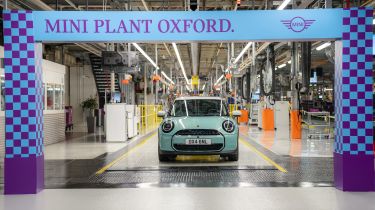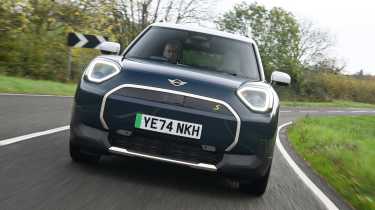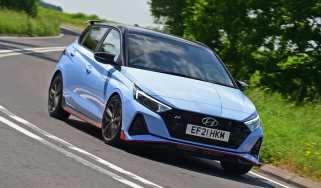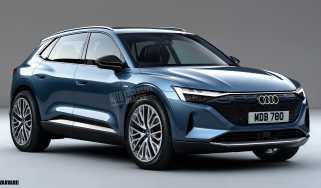BMW pauses EV production plan for MINI Oxford plant: slow electric car sales blamed
Plans to build the electric MINI hatch and Aceman in the UK are now on hold

BMW has put a £600m investment to electrify Plant Oxford on ice due to slower than expected take-up of EVs, Auto Express can reveal.
Plans to reintroduce an electric MINI hatch and start assembling the new Aceman crossover in the UK were announced in September 2023; production was due to start next year. But with electric car take-up stagnating – European Union EV sales dipped by 5.9 per cent in 2024, although petrol and diesel sales also declined – BMW has taken the decision to pause investment plans.
“Given the multiple uncertainties facing the automotive industry, the BMW Group is currently reviewing the timing for reintroducing battery-electric MINI production in Oxford,” read a statement shared with Auto Express.
Plant Oxford builds combustion engine versions of the new three-door MINI and Convertible, with BMW importing the electric hatch and EV-only Aceman from China. Such MINIs face a tariff of 20.7 per cent as they enter the EU, although the UK has not introduced any additional penalties.
The hiatus means BMW will pay import duties for longer than expected, but it evidently makes economic sense to continue with that rather than fund UK production at this time.
Auto Express understands MINI workers at Plant Oxford are aware of the decision, and BMW stresses that the factory has a sound future nonetheless. “Plant Oxford is at the heart of MINI production, manufacturing and exporting a range of models which are sought after in the UK and around the world,” added the statement.
But it throws a huge question mark over BMW’s intention to have the plant assembling nothing but zero emission cars by 2030.
The breaking news ramps up pressure on both UK and European politicians to create market conditions enabling consumer EV adoption to keep pace with tightening emissions regulation.
German EV sales plunged 27.4 per cent in 2024, the first year without any subsidies for buyers. The picture is different in the UK, which became Europe’s biggest electric market. Here, EV registrations hit a record 381,970 units and unprecedented 19.6 per cent market share, with car makers forced to give costly discounts to meet government EV sales quotas prescribed in the ZEV mandate.

The UK’s Labour Government concluded a review into the mandate on 18 February, and is expected to announce any revisions in the coming weeks. Like many car makers, BMW submitted a “lengthy” response. “We don’t believe mandates will create demand for products,” said a source. “[We’d like to see] a broader approach strengthening consumer confidence.”
EV-only car brand Polestar told the consultation it recommended halving VAT on new electric cars for three years, and letting the £40,000 threshold at which more expensive road tax kicks in rise with inflation. Polestar reckons 81 per cent of electric cars currently face this surcharge. BMW UK didn’t request any specific measures: “We’re open to the Government’s suggestions on how they can [boost demand].”
The timeline to complete BMW’s manufacturing review is “as soon as possible”. Auto Express understands the review focuses on Plant Oxford rather than the group’s broader manufacturing footprint.
But it still appears to be a discussion around when rather than if. “When is the right time to reintroduce battery electric car production at Oxford?” a source told Auto Express. “We are seeing uncertainty [now] when we need to see a clear path to electromobility so we can make the full investment in Oxford.”
BMW has already spent some of the £600m earmarked on a new components logistics hub. Some of the remaining funding will go to the Swindon pressing plant to churn out electric model body parts, but it’s Oxford assembly which will soak up the majority of the cash – assuming it’s released.
The previous Conservative Government pledged a subsidy to secure BMW’s electric investment in Oxford, thought to be an extra £60m on top of the car maker’s cash.
In response to BMW’s decision to pause its production plans, a Government spokesperson told Auto Express “We recognise the global challenges car manufacturers face and have listened to their concerns by consulting on reinstating the 2030 EV deadline whilst also protecting jobs – a decision supported by a majority of manufacturers who have been working towards this date, and are on track to meet their ZEV mandate targets."
“Last year saw record numbers of people making a supported switch to electric vehicles, with the UK leading Europe in sales, and growth of more than a fifth on the previous year. We’re investing over £2.3 billion to support industry and consumers make the switch, tapping into a multibillion-pound industry that will create high paid jobs for decades to come, making the UK a clean energy superpower and help deliver our Plan for Change."
One electrified MINI – the Countryman SUV – is European-assembled, at BMW’s Leipzig plant in Germany. It’s a multi-vehicle plant, with 1 Series and 2 Series models going down the line alongside the maxi MINI.
The investment pause reiterates the planning headache afflicting car makers as they manage the transition to electric, which is proceeding at different rates for different markets.
Government policy has propelled Norway’s EV penetration to 89 per cent of new car sales. US EV sales topped 1.3 million units in 2024, although the new Trump administration may throw the segment’s marginal growth into reverse.
The biggest global market for electrified vehicles is China where sales hit 11 million units last year (up 40 per cent), although that figure also includes plug-in hybrids.
Did you know you can sell your car through Auto Express? We’ll help you get a great price and find a great deal on a new car, too.
Find a car with the experts








